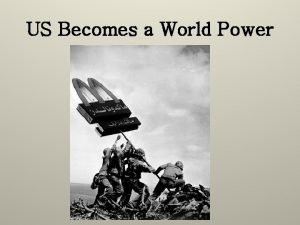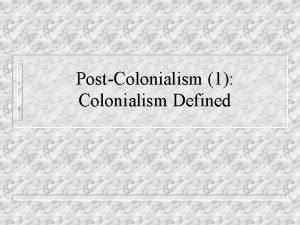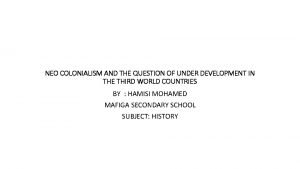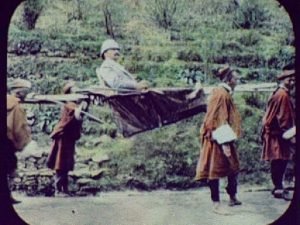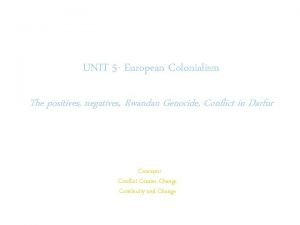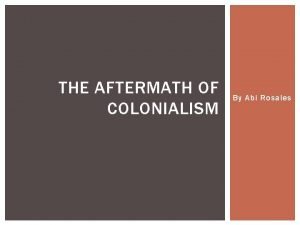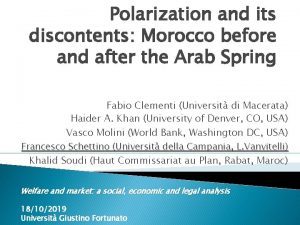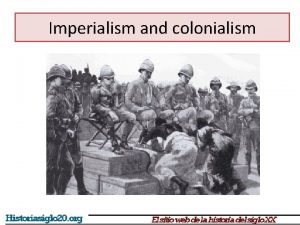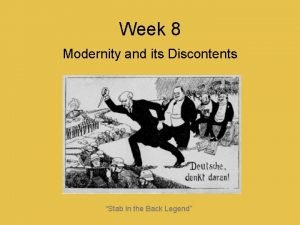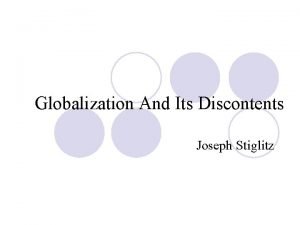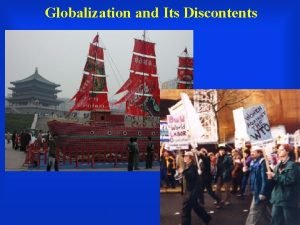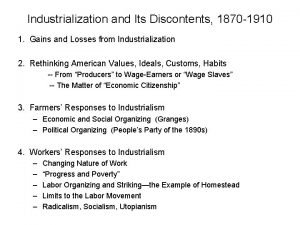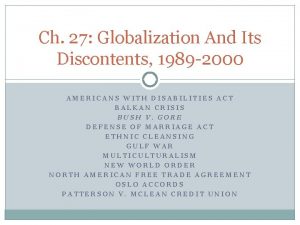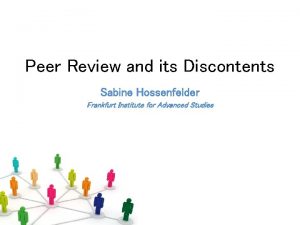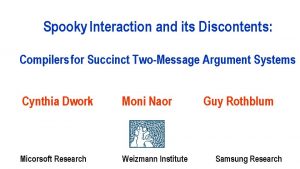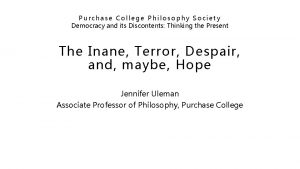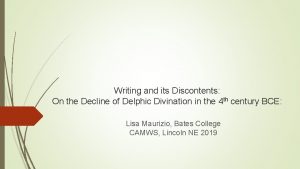Colonialism and its Discontents Colonialism meant 55 Million



















- Slides: 19

Colonialism and its Discontents

Colonialism meant 55 Million Europeans Emigrating (1820 -1920) • The Empires had grown – From 35% of earth’s surface in 1800 – 67% in 1878 – 85% in 1914 – closer to 90% in 1920 • By 1914, the British Empire measured 13. 5 million miles – 140 times the size of the UK • France controlled 4. 6 million square miles— – 25 times the size of the original Colonialism is arguably the single most important historical development that shaped modern revolutions.

• Why? -----why did the European powers engage in colonialism? GOD | GOLD | GLORY • Problem is: it’s not quite clear if colonialism paid or, more accurately, we have to be careful about: – How it paid? – Whom it paid? – When? • Long tradition of Marxian explanations along “Gold” lines: note his passage on “Finance, or the plunder of the interior” and “War, or the plunder of the exterior” (p. 655).

Not as Designed and Deliberate as it may Seem • Furthermore, parts of Empires were meant to protect other Empires. • That is: the possession of one territory required the next. • “Empire by accident” theory – Protect India – Protect Panama

THE WORLD IN 1900


Anti-colonial Revolutions were very diverse • Indonesian Independence (19451950) • Madagascar Independence (1947) • Kenyan Insurgency (1952 -56) • Cyprus (1954 -59) As Anderson points out, there was a general anarchist underpinning to many of these movements – from Cuba to the Philippines.

Revolution as Guerilla war • Essentially a direct reversal of classical warfare – Regular armies concentrate and seek decisive battle – Guerilla armies disperse and seek slow death • A guerilla force cannot hope to destroy a regular force—but it can debilitate it to the point that it can longer function. The ultimate challenge of anti-colonial revolution is thus: the revolutionary guerrillas have to balance between controlling the population and alienating it. 8

Is it a REVOLUTION or is it a WAR? • Algerian Independence (1954 -1962) – Combined guerilla with terror tactics – 400, 000 French soldiers – Classic case of “winning the battle, but losing the war” French “atrocity propaganda” (Knightley p. 400) is a wonderful illustration of how the issue was not merely a military one.

Marx the Colonialist? • Unlike previous colonial powers, “England has broken down the entire framework of Indian society” (p. 654). But this was not altogether that bad! • Whatever “may have been the crimes of England, she was the unconscious tool of history” in modernizing a primitive, feudal order. • British colonialism – like all imperial ventures – serves “a double mission”: “one destructive, the other regenerating – the annihilation of old Asiatic society, and the laying of the material foundations of Western society in Asia” (p. 659).

Colonialism is itself revolutionary “We must not forget the barbarian egotism” that pervaded India before the British: “We must not forget this undignified, stagnatory, vegetative life, that this passive sort of existence evoked on the other part, in contradistinction, wild, aimless, unbounded forces of destruction and rendered murder itself a religious rite in Hindustan. We must not forget that these little communities were contaminated by distinctions of caste and by slavery” (p. 658).

Colonial Powers: Inventing Tradition National traditions which appear to be ancient are often, in fact, recent and fabricated for the purposes of: (1) Establishing or symbolizing social cohesion or the membership of groups, real or artificial communities; (2) Legitimizing institutions, status or relations of authority; (3) Socialization, inculcation of beliefs, value systems and conventions of behavior But “novelty is no less novel for being able to dress up easily as antiquity” (Hobsbawm, p. 5).


Invention of Tradition was exported to Africa Note the manipulation of Monarchic Traditions (as they were perceived) on pp. 229 -236. • Colonial administrators “drew upon European invented traditions both to define and to justify their roles, and also to provide models of subserviance into which it was sometimes possible to draw Africans” (p. 211). • Africa was thought of as a “clean slate, ” Britain “set about inventing African traditions for Africans” (p. 212).

More generally, this cultural dimension of colonialism was arguably as crucial as the military component. • Competition – This fueled the perceived need for fabricating supposedly preexisting “rules” that exclude colonial competitors • Local allies – The whole game is impossible without these – their “hearts and minds” are a dealbreaker. • Thus you needed to “create a clearly defined hierarchical society in which Europeans commanded and Africans accepted commands, but both within a shared framework of pride and loyalty” (Ranger, p. 221).

Colonialism is a Bit Like Slavery in the US: It “Lingers” Bad • Chattel Slavery • (Colonial Era => Civil War) • Jim Crow System Better? • (Reconstruction => Civil Rights Movement) Much Better • Post-Civil Rights racial tension (prison system, residential segregation, etc. ) • (1970 s => Today)

Racism – In the context of colonialism, racism was not so much an inceptive or a push force as an enabling one. – The absolute certainty of European superiority made imperialism not only feasible, but excused it, moralized it. – The racism could be combined with religious fervor: the “white man’s burden” and mission civilisatrice. – But, much like religion—this was not so much an inceptive as for public consumption – as with French public opinion about Algeria (see Knightley).

Racial Self-Subjegation: Or, How Revolution Comes From Within • The black man’s “self-division” is a “direct result of colonialist subjugation” (p. 417). – Through language, custom, self-perception (including of corporal matters), etc. , the Black man internalizes his oppressors’ ideology. Fanon’s work became famous for arguing that true revolutionary emancipation comes not with overthrowing the colonial yolk, but overcoming the internalized inferiority within the colonized themselves; the “inborn complex” (p. 421) of the subjugated Black, the failure to demand recognition and to realize his desire for freedom, are the true obstacles.

Paradoxes of Anti-Colonial Revolutionary Doctrines • The “outrage of liberation”: the more equal an oppressed group becomes to its former oppressors, the greater the group’s sense of outrage at what has been done to them (Patterson, p. 427). Thus, the articulation of grievance, contempt, hatred, etc. do not subsidy with revolutionary de-colonization, but increase after it. This is similar to theme of selfdehumanization that we discussed in the context of war: once you rehumanize the other, things do not become easier.
 Colonialism and development: korea, taiwan, and kwantung
Colonialism and development: korea, taiwan, and kwantung What's the difference between colonialism and imperialism
What's the difference between colonialism and imperialism Post colonialism in tempest
Post colonialism in tempest Star trek colonialism
Star trek colonialism Example of colonialism
Example of colonialism Impact of neo colonialism on third world countries
Impact of neo colonialism on third world countries Key terms of post colonialism
Key terms of post colonialism First wave of colonialism
First wave of colonialism First wave colonialism
First wave colonialism Colonialism vs imperialism venn diagram
Colonialism vs imperialism venn diagram Phases of colonialism
Phases of colonialism Cause of colonialism
Cause of colonialism Height of colonialism
Height of colonialism Negatives of colonialism
Negatives of colonialism Electronic colonialism theory
Electronic colonialism theory Colonialism thesis statement
Colonialism thesis statement Key quotes in the emigree
Key quotes in the emigree Its halloween its halloween the moon is full and bright
Its halloween its halloween the moon is full and bright Examples of like parallel forces
Examples of like parallel forces Advantages of simulation and dissimulation
Advantages of simulation and dissimulation

